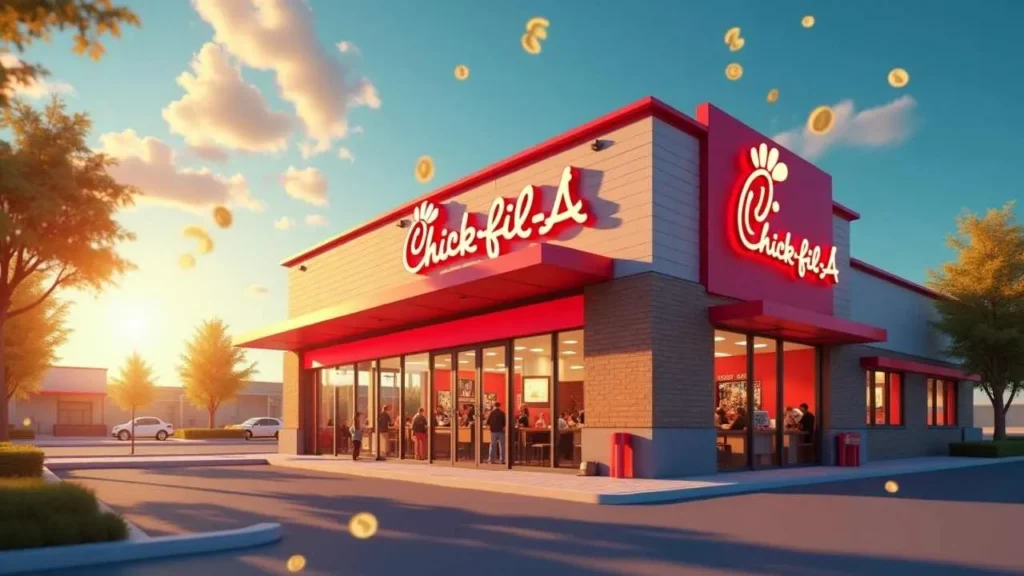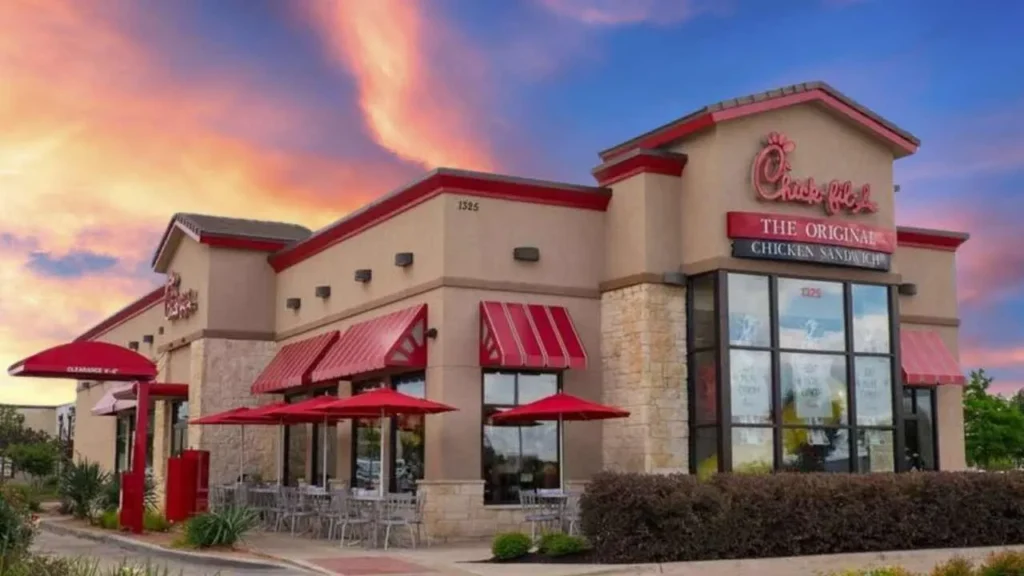Chick-fil-A Franchise Cost & Profit (2025 Guide)

When it comes to fast food in the U.S., Chick-fil-A is one name that instantly stands out. Known for its famous chicken sandwiches, waffle fries, and customer-first service, the brand has built a loyal fan base and continues to dominate the fast-food industry.
For entrepreneurs, Chick-fil-A isn’t just another restaurant—it’s one of the most profitable franchise opportunities in the world. But here’s the catch: Chick-fil-A operates differently from most other fast-food franchises. The investment costs, profit potential, and ownership model are unique compared to giants like McDonald’s, Subway, or KFC.
If you’ve ever wondered, “How much does it cost to open a Chick-fil-A franchise, and is it really as profitable as people say?”—this 2025 guide has you covered. We’ll break down the franchise model, Chick-fil-A Franchise Cost, fees, profits, requirements, and even how it stacks up against other popular franchises.
Chick-fil-A’s Franchise Business Model

Chick-fil-A has a very different approach to franchising compared to most of the fast-food giants. The company does not simply sell you a restaurant to operate- it takes its time to identify franchisees (commonly referred to as “Operators) in a very competitive process. In reality, the number of applicants that are approved every year is a small percentage.
The difference between Chick-fil-A and other restaurants is that franchising is not an investment; it is a life investment. Most franchises require mandatory upfront payments of hundreds of thousands (or even millions of dollars), but Chick-fil-A maintains an initial franchise payment of only $10,0000 dollars. The trade-off, however is that it is the Company that technically owns the restaurant real estate and equipment.
Rather, Chick-fil-A seeks candidates who have good leadership skills, practical dedication and can influence a positive culture. The operators are supposed to serve full-time, manage young teams and be very involved in their local community. This model will make sure that the Chick-fil-A restaurants will be operated by committed leaders as opposed to passive investors.
Simply put, Chick-fil-A is not the best option if you want a passive, portfolio-style business. However, to the people who are ready to work lots, assemble a team, and dedicate their time (not only money), it is one of the most satisfying prospects in the fast-food industry.
How Much Does a Chick-fil-A Franchise Cost?
One of the reasons Chick-fil-A attracts so many applicants is its surprisingly low franchise fee. While most fast-food brands ask for anywhere between $25,000 $50,000 just to sign on the dotted line, Chick-fil-A charges only $10,000 as the initial franchise fee. But before you get too excited, there’s more to the story.
Initial Franchise Fee
- $10,000 flat fee (non-gifted and non-borrowed).
- This is one of the lowest franchise fees in the fast-food industry.
- But, unlike other franchises, Chick-fil-A keeps ownership of the real estate, building, and equipment—you’re essentially operating the restaurant on their behalf.
Total Initial Investment
Even though the upfront fee is just $10,000, the total cost to launch a Chick-fil-A can fall anywhere between $440,000 $2.3 million, depending on the location and type of restaurant (freestanding store, mall outlet, or airport).
These costs include:
- Inventory (initial stock of food and supplies)
- Lease or sublease of premises
- Equipment rental
- Insurance
- Working capital for staffing and early expenses
| Expense Category | Estimated Low Cost | Estimated High Court |
| Initial franchise fee | $10,000 (fixed) | $10,000 (fixed) |
| Opening inventory | $15,000 | $121,000 |
| Equipment Rental | $750 | $5,000 |
| Lease/Sublease | $2,600 | $95,180 |
| Insaurace | $240 | $10,700 |
| Additional funds | $415,600 | $2,096,700 |
| Total costs | $444,242 | $2,338,786 |
Chick-fil-A vs Other Fast-Food Franchises (2025)
| Franchise Brand | Franchise Fee | Total Initial Investment | Ownership model |
| Chick-fil-A | $10,000 | $440,000 – $2.3M | Operator runs store, but company owns real estate & equipment |
| McDonald’s | $45,000 | $1.4M – $2.6M+ | Franchisee owns/leases restaurant, more autonomy |
| Subway | $15,000 | $150,000 – $300,000 | Lower cost, but lower average sales |
| KFC | $45,000 | $1.2M – $2.5M+ | Traditional franchise ownership |
Chick-fil-A Franchise Fees & Royalties
One of the most important things to understand before becoming a Chick-fil-A Operator is how the ongoing fees and profit sharing work. Unlike other franchises, Chick-fil-A has a unique structure designed to reduce upfront financial risk but maintain a highly involved, hands-on approach.
Royalty Fees
- Chick-fil-A charges a standard royalty of 15% of sales.
- This is slightly higher than some other fast-food franchises, but it covers the support, branding, training, and ongoing guidance you receive from the company.
- Think of it as paying for a proven system that consistently drives high sales.
Profit Sharing
- Unlike traditional franchises, where operators keep all profits after costs, Chick-fil-A has a profit-sharing model.
- After paying royalties and expenses, Operators share 50of thehe remaining pretax profit with Chick-fil-A.
- While it may sound steep, many Operators still earn a high annual income because Chick-fil-A locations are extremely profitable, with some generating millions in sales.
Additional Costs
- Operators are also responsible for day-to-day operational costs: employee wages, utilities, food and inventory replenishment, insurance, and local marketing.
- There are no hidden fees, but remember that running a Chick-fil-A is a hands-on, full-time commitment, so time and leadership effort are part of the “cost” too.
In short, while Chick-fil-A reduces your initial financial risk, the royalty and profit-sharing system ensures you are fully invested in operating a successful restaurant.
Chick-fil-A Franchise Profit & Earnings
One of the most common questions aspiring franchisees ask is: “How much money can I actually make?” While Chick-fil-A doesn’t guarantee earnings, data from Operators and industry reports give a good picture of potential profits.
Average Annual Sales
- Chick-fil-A restaurants are among the highest-grossing fast-food chains in the U.S..
- On average, a single Chick-fil-A location generates around $6 million to $7 million in annual sales.
- Some of the busiest locations even cross $10 million per year, far exceeding most other quick-service restaurant chains.
Operator’s Earnings
- After paying the 15% royalty and sharing 50% of pretax profit with the company, Operators typically earn $150,000 to $200,000 per year in the first few years.
- Experienced Operators with high-traffic locations can earn significantly more, sometimes reaching $250,000 to $300,000 annually.
- It’s important to note that profits may be lower during the first year or two, as Operators get accustomed to running the business and building their team.
Requirements to Own a Chick-fil-A Franchise
Owning a Chick-fil-A franchise isn’t like buying any other fast-food outlet. The company looks for leaders who are ready to invest their time and energy, not just money. Here’s what you need:
- Legal Right: You must have the legal right to own and operate a franchise in the U.S.
- Franchise Fee: $10,000 in non-gifted, non-borrowed funds for the initial franchise fee.
- Financial History: No bankruptcy in your financial history.
- Full-Time Commitment: You must be hands-on and actively manage day-to-day operations.
- Dedication: Divest yourself of any non-passive business ventures to focus on your Chick-fil-A.
- Experience: At least 5 years of professional work experience.
- Leadership: Proven experience leading a team of people.
- Language Proficiency: Must be fluent in English, both written and spoken.
Chick-fil-A’s rigorous selection process ensures that only candidates with passion, discipline, and leadership skills are chosen to operate their restaurants.
Pros and Cons of Owning a Chick-fil-A Franchise
Pros
- High Revenue Potential: Chick-fil-A locations consistently rank among the top-grossing fast-food restaurants.
- Low Initial Fee: The franchise fee is just $10,000, one of the lowest in the industry.
- Strong Brand Support: Comprehensive training, marketing, and operational guidance from the company.
- Hands-On Community Impact: Operators are actively involved in shaping culture and serving the local community.
Cons
- Profit Sharing: 50% of pretax profit goes to Chick-fil-A after royalties.
- No Real Estate Ownership: Operators do not own the building or land; the company does.
- Full-Time Commitment: This is not a passive investment; it requires long hours and active management.
- Highly Competitive Selection: Only a small percentage of applicants are chosen, making it tough to get approved.
Chick-fil-A Franchise for Sale: How to buy an existing franchise (if available)
Unlike many fast-food brands, Chick-fil-A rarely sells existing restaurants on the open market. Instead, new franchise opportunities are offered through the company’s candidate community, ensuring that each Operator is carefully selected and prepared to maintain the brand’s high standards.
Here’s how the process works:
- Join the Candidate Community: Start by registering through Chick-fil-A’s official website to become part of their candidate pool.
- Complete the Application Process: Demonstrate your leadership skills, professional experience, and commitment to operating a Chick-fil-A restaurant.
- Get Matched to a Location: If selected, you’ll be assigned to a new or upcoming location rather than purchasing an existing franchise from another Operator.
This method allows Chick-fil-A to maintain consistency, quality, and a strong company culture across all locations, which is a key factor behind the brand’s ongoing success.
Conclusion
There is no other opportunity to own a franchise of a fast-foodrestaurant such as Chick-fil-A. Although the upfront cost of starting a franchise business is quite low, a non-refundable fee of 10,000 dollars, the business structure demands the investment of full-time, physical presence, and willingness to establish a favourableculture in yoyour neighbourhood. The franchise distinctive profit sharing structure and real estate and equipment owned by Corporation diminish the risk at the onset, yet Operators should be willing to dedicate their time and efforts to ensure the success of the restaurant.
Not only is Chick-fil-A one of the most profitable franchise offers in the fast-food sector, but it is also one of the most rewarding and lucrative deals, with a willingness to invest oneself in the company fully.
FAQs
How much does it cost to open a Chick-fil-A franchise?
Although the franchise fee is $10,000, the total of $440,000 and $2.3 million is a range of investment in franchises of a certain location and type of restaurant, depending on the location and type.
What are the royalty fees for Chick-fil-A franchises?
Chick-fil-A pays a 15% royalty on sales, and Operators receive half of the pretax profit with the company after expenses.
Can I open a Chick-fil-A franchise in India?
At present, Chick-fil-A franchises can be found only in the U.S., Canada and Puerto Rico. India has no plans going on at this moment.
How profitable is a Chick-fil-A franchise?
Chick-fil-A restaurants are some of the most profitable fast-food restaurants in the U.S., and the Operator of the restaurant usually gets to earn a range of $150,000 to $200,000 in the initial year, with highly experienced Operators in busy locations of the restaurant earning higher.
Is $10,000 really enough to start a Chick-fil-A franchise?
The initial franchise fee is 10,000 USD, although the amount to invest to establish and run a single location is significantly greater. The cheap fee is compensated with the fact that Chick-fil-A owns property and machinery, and the model is less risky financially, but it is demanding full-time dedication.